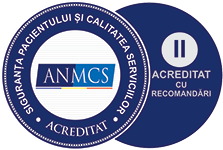What is colorectal cancer?
It is cancer that occurs in the colon or rectum. Sometimes abnormal growths, called polyps, form in the lining of the intestine.
Over time, some polyps can develop into cancer.
What are the risk factors for developing colorectal cancer?
The risk increases as we get older. About 90% of cases occur in people aged 50 and over.
Other risk factors include:
- Personal or family history of colorectal cancer or colon polyps
- Genetic syndromes such as familial adenomatous polyposis or hereditary non-polyposis colorectal cancer (Lynch syndrome).
Lifestyle factors that may contribute to an increased risk of colorectal cancer:
- Lack of regular physical activity
- A low fruit and vegetable diet
- A diet low in fibre and high in fat or a diet high in processed meat
- Obesity
- Alcohol and tobacco consumption
- Inflammatory bowel disease, such as Crohn’s disease or ulcerative colitis




 Română
Română English
English